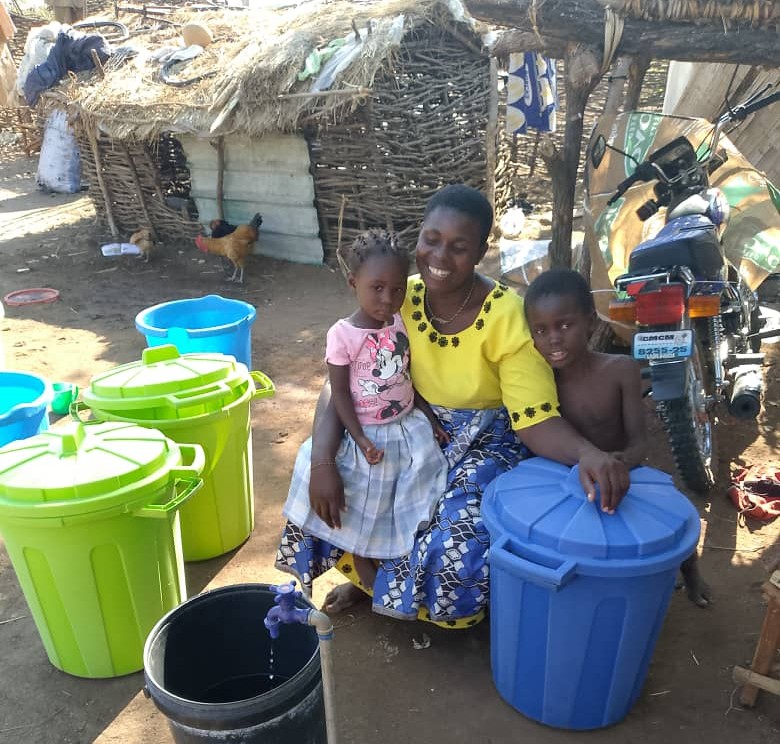In Senior Group Mpheza, under Sub-Chief Chitani in Chikwawa District, the sound of flowing water no longer echoes only from distant boreholes. It now runs quietly through household taps, a sound that, for many families, marks the beginning of a new chapter.
For Anne Osman Sailos, a mother of five and small-scale businesswoman, that sound still feels like a miracle.
“I remember when I first turned on the tap at my house,” she recalls, her face lighting up. “Everyone was surprised that water was flowing right here in my yard. We didn’t have to worry about fetching water for cooking or bathing; it was right there. It was such a joyful moment.”
Anne has lived in this community for eight years. Before the water system came, her family fetched water from Namikalango borehole, a staggering three kilometers away. “Sometimes, I’d leave early in the morning and only return in the afternoon with water,” she says. “If I traveled and came back home late, I couldn’t get any water. We had to ask neighbors for help.”
The challenges were more than just distance. The borehole, shared by hundreds, became a place of tension and exhaustion. “There were so many people there,” Anne explains. “And once, someone even put trash in my bucket after we argued. I feared what else could be put in there, even poison. That’s how desperate it was just to get water.”
That desperation shaped every part of Anne’s day. As a trader who sells bonya (dried fish), nandolo (pigeon peas), and nseula, she often needed to leave early for town, but water scarcity made that nearly impossible. “I had to go to the borehole first, and by the time I finished, it was too late for business or farming. My children couldn’t help because it was too hard for them to fight for space among adults.”
Her family’s struggles reached a breaking point when one of her children fell sick with cholera. “It was because of the water problem,” she says softly. “We didn’t have clean or safe water then.”
When the Mpheza Water System was introduced through the partnership between BASEflow and the Southern Region Water Board (SRWB) with financial support from Trocaire, the community saw hope; but Anne saw something more: opportunity. The system established three community kiosks where residents could fetch safe, treated water. For some, that was enough.
But Anne wanted to go a step further.
“My desire was to have my own water; water I could use freely, without fights or waiting in line,” she says. “So I decided to get a household tap.”
Working with the local team, Anne and her neighbors contributed to digging trenches and purchasing pipes to bring water directly to their homes. Each household was required to take part in the trench work and buy their own pipes, and Anne spent K150,000 in total, an amount that covered both the cost of materials and Southern Region Water Board labor for the connection. “The SRWB team connected the meter quickly,” she adds. “The monthly water bill is affordable, and we can manage it.”
The day her tap began to flow marked not just convenience, but dignity. “For the first time, I felt free,” she says with a smile. “I don’t have to carry clothes to the sugarcane canal anymore to wash. My children are safe from crossing roads just to fetch water. Life has changed tremendously.”
Anne’s household is one of over ten that now have direct tap connections, complementing the kiosks that serve the broader community. The difference, she says, is profound; not just in her home, but across Mpheza.
“At the borehole, the water wasn’t treated. Now we drink clean, chlorinated water. Visitors come here and say, ‘We wish we had this too.’ I tell them, ‘You can, it’s possible!’”
Anne’s tap has also become a small community lifeline. “When the kiosks are crowded, some people come to get water from us,” she says. “We help where we can. That’s what community means.”
This system has been such a blessing for Mpheza because Chikwawa is an arid area, and drilling boreholes is extremely difficult due to high salinity levels. Accessing safe water here has always been a challenge, and the arrival of this piped system is nothing short of transformative.
Still, not everyone in Mpheza enjoys this new reality. “There are people upslope who still fetch water from Namikalango,” Anne notes. “Their situation is dire. I wish this water system could reach them too.”
She also speaks of the few remaining challenges. “Sometimes we go without water for a couple of days because of electricity outages and rationing with the Misewu Folo users downslope,” she says. “We were told a tank will be built to help with that, I really look forward to that day.”
Despite those challenges, Anne’s gratitude is clear. “I am grateful for this life-changing development,” she says. “Now, I can do business, take care of my family, and live without fear. This water has changed my life.”
The Mpheza Water System stands as proof to what community-driven development can achieve, transforming daily burdens into moments of dignity, health, and hope. For Anne, that transformation begins every morning when she turns on her tap, a small act that reminds her just how far her community has come.
“Every drop from this tap means freedom,” she says, smiling. “And I pray that one day, everyone in Mpheza will have the same.”
LIke what we do ?
Please click the Download button below to get the manual and start contributing. Or if you like what we are doing and would like to support our work, click the Donate button.


